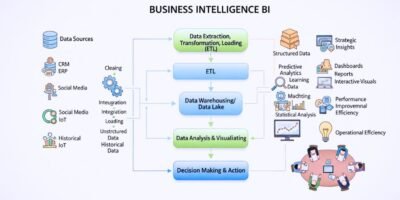In the relentless cycle of modern software development, speed is critical, but quality is non-negotiable. A single bug in production can erode user trust and impact the bottom line. This is why a robust automated testing strategy is no longer a luxury but the foundational pillar of any successful engineering team.
At the heart of this strategy lies the testing framework—the set of guidelines, tools, and best practices that provides the structure for test automation. Choosing the right framework is a crucial decision that significantly impacts efficiency, scalability, and the overall success of a QA process. As we look at the landscape in 2025, these are the top 5 frameworks that are empowering teams to build better software, faster.
Playwright
Developed by Microsoft, Playwright has rapidly surged in popularity to become a dominant force in end-to-end web testing. It’s a modern, fast, and incredibly reliable framework designed to handle the complexities of today’s web applications.
Its standout feature is its ability to test across all modern rendering engines, providing true cross-browser confidence.
- True Cross-Browser Support: Natively supports Chromium (Google Chrome, Microsoft Edge), Firefox, and WebKit (Apple Safari), allowing you to run the same tests across all major browser engines.
- Auto-Waits and Reliability: Playwright automatically waits for elements to be ready before interacting with them, which eliminates a major source of flaky, unreliable tests.
- Powerful Tooling: Comes with exceptional tools like Codegen (to record tests), Trace Viewer (to inspect test runs step-by-step visually), and parallel execution out of the box.
- Language Versatility: Offers official support for TypeScript, JavaScript, Python, Java, and .NET, making it accessible to a wide range of development teams.
Best For: Teams that need reliable, fast, and truly cross-browser end-to-end testing for modern web applications.
Selenium
Selenium is the undisputed titan and the long-standing industry standard for web browser automation. As a W3C standard, the WebDriver protocol it pioneered serves as the foundation for many other modern tools.
Its greatest strengths are its immense flexibility, massive community, and unparalleled support for different programming languages and browsers.
- Unmatched Language and Browser Support: Supports a vast array of programming languages (Java, C#, Python, Ruby, JavaScript, etc.) and virtually every browser on the market.
- Massive Community and Ecosystem: With decades of use, an enormous global community has developed, along with numerous tutorials, third-party plugins, and commercial support services.
- Flexibility and Scalability: Selenium is not an all-in-one tool; it’s a library. This allows you to build a highly customized testing framework using your preferred test runners and assertion libraries.
- Selenium Grid for Parallel Testing: Provides a straightforward way to run tests in parallel across multiple machines, browsers, and operating systems, significantly speeding up test cycles.
Best For: Large enterprises with diverse tech stacks, teams with specific language requirements, and projects that require a highly customized and flexible testing solution.
Cypress
Cypress revolutionized the world of end-to-end testing by focusing on the developer experience. It is an all-in-one, JavaScript-based framework that is famously easy to set up and provides a fast, interactive, and highly visual testing process.
Its unique architecture, which runs in the same run-loop as the application, gives it powerful debugging capabilities.
- Excellent Developer Experience: Known for its simple setup, interactive Test Runner, and detailed, readable error messages that make writing and debugging tests fast and intuitive.
- Time Travel and Debuggability: Cypress takes snapshots of your application as tests run, allowing you to “time travel” back to see the exact state of the DOM at each step, making debugging incredibly easy.
- All-in-One Framework: Comes with everything you need out of the box: a test runner, assertion library, mocking and stubbing capabilities, and more—no need to cobble together different libraries.
- Built for the Modern JavaScript Ecosystem: Deeply integrated with the JavaScript world, making it a natural choice for front-end developers working with frameworks like React, Angular, and Vue.
Best For: Front-end developers, QA engineers working in JavaScript/TypeScript, and teams that prioritize a fast, interactive, and highly visual debugging experience.
Appium
When it comes to testing on mobile devices, Appium is the open-source standard. It extends the Selenium WebDriver protocol to allow for the automation of native, mobile web, and hybrid applications on iOS, Android, and other platforms.
Appium enables you to write your tests in your preferred language, against the same API you use for web testing, thereby creating a unified automation strategy.
- Cross-Platform Mobile Testing: A single test script can often be used to test your application on both iOS and Android devices, saving significant time and effort.
- Supports Native, Hybrid, and Mobile Web: Provides the flexibility to test any mobile application without requiring you to modify your app’s code.
- Uses the WebDriver Standard: Teams already familiar with Selenium will find the learning curve for Appium to be very gentle, as it uses the same core principles and protocols.
- Strong Language and Tool Integration: As a widely adopted open-source project, it integrates seamlessly with various test runners and CI/CD pipelines.
Best For: QA teams responsible for testing native or hybrid mobile applications and organizations looking to extend their web automation skills to mobile platforms.
Postman
While often seen as an API development tool, Postman has evolved into a comprehensive and accessible framework for API testing and development. It allows you to design, test, and document your APIs in a single, collaborative platform.
With its intuitive GUI for creating requests and its powerful Collection Runner and Newman CLI tool, it has become the starting point for most API automation.
- API-First Workflow: An all-in-one platform that covers the entire API lifecycle, from design and mocking to automated testing and monitoring.
- User-Friendly Interface: Allows testers to create complex API tests, including assertions and request chaining, through an intuitive graphical interface without writing a lot of code.
- Collection Runner and Newman for Automation: Run entire collections of API tests at once from the app or use the command-line tool, Newman, to integrate your API tests directly into your CI/CD pipeline.
- Powerful Collaboration Features: Workspaces allow teams to share collections, environments, and test results, ensuring everyone is on the same page.
Best For: QA engineers and developers focused on API testing, microservices validation, and teams that need a collaborative platform for the entire API lifecycle.
Conclusion
The software testing framework you choose is a critical investment in the quality and velocity of your development process. In 2025, the landscape is rich with powerful, specialized tools. Playwright is the modern champion of reliable web testing. Selenium remains the flexible industry standard. Cypress provides an unmatched developer experience. Appium is the undisputed king of mobile. And Postman makes robust API testing accessible to all.
By carefully evaluating your application’s architecture, your team’s skillset, and your project’s goals, you can select the framework that will serve as the unshakable foundation of your quality assurance strategy.













